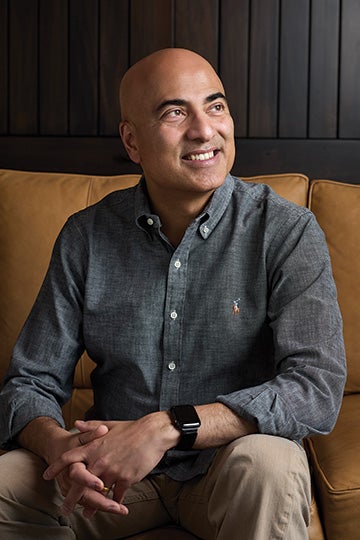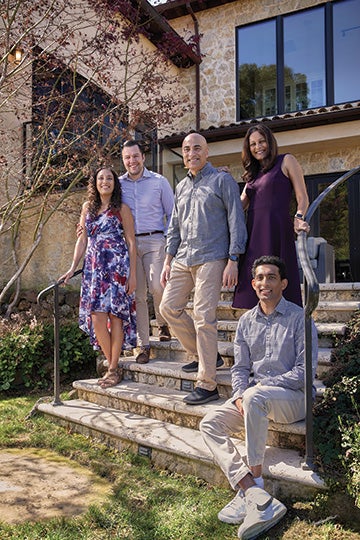Uplifting Technology
For Rice trustee Vinay Pai, community is a core component of tech advancement.

Spring 2024
By Katy Munger
Vinay Pai ’88, ’91 is the original techie. He taught himself how to code in 1981, when many people had never even heard of a home computer. Since then, he has earned three technical degrees from Rice, contributed to the growth of multiple startups, become a successful venture investor, and earned a reputation as one of the best chief technology officers in the business. But Pai’s most enduring contribution to the field may be his work leveraging cloud-based services — including AI — for the benefit of underserved communities.
At the heart of Pai’s success is his determination to put people first. During his five-year tenure at Bill — a cloud-based software company that transformed the way small and medium-sized businesses manage their finances — he expanded the engineering team from 60 to 750 people and helped implement two product launches, several major acquisitions and a successful IPO. Before Bill, he worked at a number of pioneering tech firms, including First Data, Intuit, PayCycle, Cassatt, Sun Microsystems and Schlumberger.
Leveling the playing field
As Pai’s career progressed, he soon realized that new technology could empower untapped market segments. “Large corporations used to get all the best tools,” he explains. “But these days, because of Software as a Service and the cloud, the software that a smaller business can buy is actually better than what enterprises are getting.”
Pai’s commitment to leveling the financial playing field inspired him to co-found his latest venture, Prósperos, a consumer fintech, or financial technology, startup focused on helping underserved communities in the United States. Still in stealth mode, Prósperos is scheduled to open its virtual doors this year with Pai as CEO and his wife, Aarti — who holds a master’s in computer science — serving as director of business operations.
A life based on community
Technology is a family affair for the entire Pai clan, with two generations holding technical degrees. This legacy may be one reason Pai finds inspiration for being a better tech leader in both his professional and personal life. For example, a stint coaching his son’s basketball team — and seeing another coach scream at his own players — gave Pai insight into how to be a more successful manager. (Hint: It does not involve screaming.)
I realized that if you have a team that mirrors the demographics of your customer base, or gets closer to it, you’ll make better products — which in turn drives better business results.
“You can look at people you admire and say, ‘Oh, that worked really well,’” he says. “But you can also look at other people and say, ‘I don’t want to be like that guy.’ Either way makes you a better leader.”
Likewise, for both practical and personal reasons, he became devoted to inclusion in technology early on. The practical: “I realized that if you have a team that mirrors the demographics of your customer base, or gets closer to it, you’ll make better products — which in turn drives better business results,” he says. The personal: “Almost everyone now has a wife or a mother or daughter in a STEM field,” he adds. “So this is one way you make the world a better place for your kids.”

Pai’s commitment to Rice also reflects his belief in community. Whether he’s talking about his undergraduate days at Jones College, his role as chair of the engineering advisory board, or his appointment to the Rice Board of Trustees, Pai is deeply devoted to Rice and to President Reginald DesRoches’ long-term vision for its future.
“I’m a huge fan of Reggie,” Pai says. “Now that he’s president, he’s become focused on making Rice a premier research institution, which I fully support.” Inspired by the success stories of institutions like Stanford and MIT, Pai sees his role in this transformation as fostering collaborations with venture capitalists to accelerate the commercialization of groundbreaking ideas developed at Rice.
If people have equal economic opportunities and can make a good living, a lot of social problems go away.
Philanthropy is also a core value for Pai and his wife, who have established an endowed scholarship at Rice as well as a chair in computer science, with the help of a matching grant from John ’73, ’74 and Ann Doerr ’75. Their focus on education is deliberate.
“If you look at the injustice and social unrest that happens in the U.S., there’s a very straightforward way to fix those problems,” Pai says. “If people have equal economic opportunities and can make a good living, a lot of social problems go away. But for that to happen, people need access to high-paying jobs that require a great education. It’s important to be a part of the solution and to think about how we can all give back to society.”
